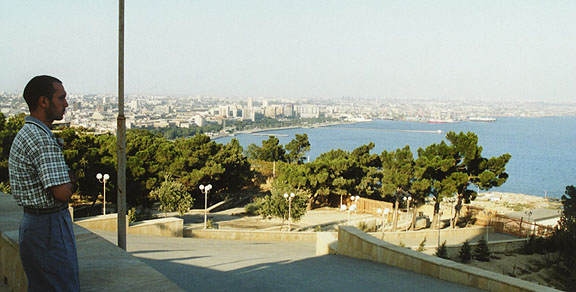
Peace Corps Programs in Azerbaijan
Azerbaijan is approximately the size of the state of Maine. Despite its small size, Azerbaijan contains significant ecological diversity, with nine distinct climatic zones. Its highest mountain in the Caucasus range is perennially snow-covered Mount Bazarduzu (14,645 feet), while the Caspian littoral is below sea level.
Dense hardwood forests cover the lower slopes of the mountains, while the center of the country is largely flat and sparsely vegetated. The lowlands near the Iran border are home to a cornucopia of lush fruit orchards.
With the exception of its high Caucasus areas, Azerbaijan is milder, and has less rain, than its neighbors Armenia and Georgia. Winter temperatures rarely fall below 40 degrees Fahrenheit in Baku, and summer temperatures range from the 70s to over 100 degrees.
Azerbaijan contains significant ecological diversity, with nine distinct climatic zones. Its highest mountain in the Caucasus range is perennially snow-covered Mount Bazarduzu (14,645 feet), while the Caspian littoral is below sea level.
The Apsheron Peninsula, where Baku is located, and the adjacent Caspian coast are thought to contain substantial deposits of natural gas and oil. Exploitation of these resources without attention to environmental protection has resulted in serious onshore and offshore oil and air pollution, which the government is only beginning to address.
The economy relies on the country's oil and natural gas resources. With its huge Caspian Sea oil reserves, Azerbaijan has great potential for economic development. Construction, exploration, and production contracts with foreign oil firms will benefit Azerbaijan in the form of new jobs, foreign capital, and high revenues.
In 1999, a pipeline opened that carries oil through Georgia to a port on the Black Sea, giving Azerbaijan direct access to Europe. An additional pipeline is being planned to deliver oil from the Caspian Sea to the Mediterranean Sea, but regional differences make the international agreement tentative. Estimates for oil and gas revenues hover at the $1 billion-a-year range in just a few years.
In agriculture, the most important cash crops are cotton and tobacco, which provide employment in rural areas. Azerbaijan also exports fruits, vegetables, nuts, and saffron. Production is not very efficient, but reform programs are underway to improve output and raise revenues.
Almost 90 percent of the current population is ethnic Azeri. Russian, Tatar, Talysh, Georgian, Ukrainian, Armenian, Lezghian, Kurdish, and other minorities also live in Azerbaijan. More than 2 million people live in Baku, the capital. Although it is a cosmopolitan city with many grand buildings and mosques, one million internal refugees live in camps or other temporary settlements, representing a major social and economic problem.
Azerbaijani belongs to the Oghuz Seljuk group of Turkic languages and is similar to modern Turkish. During the Soviet era, Russian and Azerbaijani were both official languages, though Russian was dominant for government purposes. Today, Azerbaijani is dominant for all purposes.
Azerbaijan has traditionally been an Islamic nation and Shiites are the dominant sect. Religious observance weakened during the Soviet era, however, and two generations grew up with little knowledge of Islam, so Azerbaijan is more secular than many of its neighbors. Today, people may practice their religion freely, praying at home and attending mosques. Those of Jewish, Russian Orthodox, and Armenian Christian faith also openly practice their religion.
